Citizen House
The Citizens' House is a large-scale experiment in non-plutocratic governance and retroactive rewards for onchain event organizers and community builders. The Citizens’ House will work alongside the Token House to govern the Legislature Branch of United Stands of Lemonade.
In its first stage, the Citizens’ House is solely responsible for voting on the allocation of Retroactive Rewards (Retro Rewards). During this bootstrapping phase, the Lemonade Foundation will determine the scope and amount of each funding round, as well as administer the voting process. Holding a Passport in this initial stage does not guarantee permanent participation in the Citizens’ House and future iterations of Retro Funding.
Funding for Retro Funding can come from:
Retroactive Rewards Fund token allocation (20% of the initial $LEMON supply)
Allocation of surplus platform, marketplace and protocol revenue
In future stages, the Citizens’ House role will expand beyond Retro Rewards. For example, in addition to voting on Retro Rewards, the Citizens’ House will work alongside the Token House to govern allocation of surplus platform, marketplace and protocol revenue, collaborate on criteria for participation in the Citizens’ House, and engage in a system of checks and balances to enforce the Lemonade’s Codes of Conduct.
How Retro Rewards Work
Retroactive Rewards (Retro Rewards) is based on the idea that it’s easier to agree on what was authentic, positive and impactful in the past than what might be useful in the future. This is a series of experiments inspired by the Optimism Collective’s Retroactive Public Goods Funding (RPGF) initiative, where members of the Citizens’ House allocate surplus protocol revenue or portions of the Retro Rewards token allocation to event organizers, creators and communities they deem have provided positive impact to the Lemonade ecosystem. This is core to Lemonade’s value ofonline = onchain: the idea that that positive growth & engagement of onchain commerce enable supporting the wider movement of bringing the next billion onchain.

These rewards create strong incentives for event organizers and community builders to build to build onchain.
The aggregate effect is an ecosystem that is easier to build on, learn about, and connect to, in turn driving application usage and generating more demand for blockspace across the Lemonade Superchain, all ecosystem partner chains, Lemonade platform and marketplace. By funding creators & communities sustainably, the Lemonade can create a rich ecosystem and a better economy.
Retro Rewards also provides possible exit liquidity for public goods projects, which opens up a market for early investment in those projects. This means creators, event organizers and communities can:
Be rewarded for their positive contributions without generating direct revenue
Raise capital and additional sources of revenue to bootstrap based on the early potential and promise of their project
A Commitment to Experimentation

Retro Rewards is a long-term approach to build a vibrant economy that empowers creators and event organizers to build community and drive commerce onchain. The United Stands of Lemonade will conduct regular rounds of Retro Rewards, each different from the last. This is an iterative process that will implement learnings from each round towards empowering authentic participants driving positive impact and eliminating participants and projects that are a net negative to the ecosystem.
Retro Rewards - Airdrop 1
Q4-2024
Lemonade Stands that meet the qualification criteria approved by Citizen House and the Lemonade Foundation
Retro Rewards - Airdrop 2
TBD
Lemonade Stands that meet the qualification criteria approved by Citizen House and the Lemonade Foundation
Retro Rewards - Future Rounds
TBD
Based on iterations and learnings from Retro Rewards Airdrop 1 & 2
Experimentation Framework
Retro Funding has three core components, each with substantial surface area for experimentation.
Impact scoping: what should the Legislature reward? How is it defined and decided on?
Impact scoring: how does the Citizens’ House evaluate impact? What units, process, or tools do we use?
Impact settlement: how does voting work?
For the first several rounds of Retro Rewards, the Lemonade Foundation will decide on scope and voting mechanics with input from the community. Eventually the set of variables around what to fund, how much to fund, and how to vote will be up to the Citizens’ House, with checks and balances from the Token House and the Executive Branch of United Stands of Lemonade.
Over time, the United Stands of Lemonade aims to transfer the ownership completely to the Legislature without any involvement from the Lemonade Foundation. To get there, we must refine the tools and processes used for Retro Rewards based on regular experimentation.
Citizen House
The Citizens' House is a large-scale experiment in non-plutocratic governance and retroactive rewards for onchain event organizers and community builders. The Citizens’ House will work alongside the Token House to govern the Legislature Branch of United Stands of Lemonade.
In its first stage, the Citizens’ House is solely responsible for voting on the allocation of Retroactive Rewards (Retro Rewards). During this bootstrapping phase, the Lemonade Foundation will determine the scope and amount of each funding round, as well as administer the voting process. Holding a Passport in this initial stage does not guarantee permanent participation in the Citizens’ House and future iterations of Retro Funding.
Funding for Retro Funding can come from:
Retroactive Rewards Fund token allocation (20% of the initial $LEMON supply)
Allocation of surplus platform, marketplace and protocol revenue
In future stages, the Citizens’ House role will expand beyond Retro Rewards. For example, in addition to voting on Retro Rewards, the Citizens’ House will work alongside the Token House to govern allocation of surplus platform, marketplace and protocol revenue, collaborate on criteria for participation in the Citizens’ House, and engage in a system of checks and balances to enforce the Lemonade’s Codes of Conduct.
How Retro Rewards Work
Retroactive Rewards (Retro Rewards) is based on the idea that it’s easier to agree on what was authentic, positive and impactful in the past than what might be useful in the future. This is a series of experiments inspired by the Optimism Collective’s Retroactive Public Goods Funding (RPGF) initiative, where members of the Citizens’ House allocate surplus protocol revenue or portions of the Retro Rewards token allocation to event organizers, creators and communities they deem have provided positive impact to the Lemonade ecosystem. This is core to Lemonade’s value ofonline = onchain: the idea that that positive growth & engagement of onchain commerce enable supporting the wider movement of bringing the next billion onchain.


These rewards create strong incentives for event organizers and community builders to build to build onchain.
The aggregate effect is an ecosystem that is easier to build on, learn about, and connect to, in turn driving application usage and generating more demand for blockspace across the Lemonade Superchain, all ecosystem partner chains, Lemonade platform and marketplace. By funding creators & communities sustainably, the Lemonade can create a rich ecosystem and a better economy.
Retro Rewards also provides possible exit liquidity for public goods projects, which opens up a market for early investment in those projects. This means creators, event organizers and communities can:
Be rewarded for their positive contributions without generating direct revenue
Raise capital and additional sources of revenue to bootstrap based on the early potential and promise of their project
A Commitment to Experimentation


Retro Rewards is a long-term approach to build a vibrant economy that empowers creators and event organizers to build community and drive commerce onchain. The United Stands of Lemonade will conduct regular rounds of Retro Rewards, each different from the last. This is an iterative process that will implement learnings from each round towards empowering authentic participants driving positive impact and eliminating participants and projects that are a net negative to the ecosystem.
Retro Rewards - Airdrop 1
Q4-2024
Lemonade Stands that meet the qualification criteria approved by Citizen House and the Lemonade Foundation
Retro Rewards - Airdrop 2
TBD
Lemonade Stands that meet the qualification criteria approved by Citizen House and the Lemonade Foundation
Retro Rewards - Future Rounds
TBD
Based on iterations and learnings from Retro Rewards Airdrop 1 & 2
Experimentation Framework
Retro Funding has three core components, each with substantial surface area for experimentation.
Impact scoping: what should the Legislature reward? How is it defined and decided on?
Impact scoring: how does the Citizens’ House evaluate impact? What units, process, or tools do we use?
Impact settlement: how does voting work?